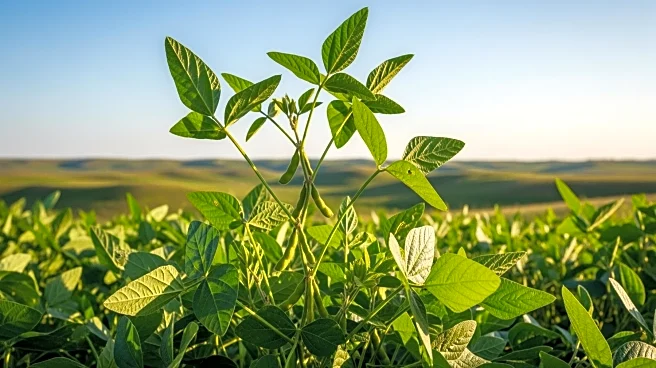What's Happening?
Earnest Agriculture, an agricultural biotech company based in Rantoul, Illinois, is accelerating the growth of its Prairie Power Soybean product following successful multi-state field trials. The trials demonstrated
a consistent 6% yield increase, translating to economic benefits for farmers. The company plans to expand production and distribution, targeting 50,000 acres in 2026. Earnest Agriculture uses natural microbial solutions to improve crop yields and soil health, reducing chemical inputs. The company is seeking partnerships with seed developers and ag retailers to integrate its microbial platform into their pipelines.
Why It's Important?
The expansion of Prairie Power Soybean represents a significant advancement in sustainable agriculture, offering farmers a viable alternative to chemical inputs. By leveraging natural microbial solutions, Earnest Agriculture addresses challenges related to soil health and rising input costs. The company's approach aligns with broader efforts to promote environmentally friendly farming practices and reduce the agricultural sector's environmental footprint. Successful implementation of these solutions could lead to increased crop yields and reduced reliance on chemical fertilizers, benefiting both farmers and the environment.
What's Next?
Earnest Agriculture plans to launch Prairie Power Corn in 2026, further expanding its portfolio of microbial farm inputs. The company is actively seeking partnerships with large seed developers and ag retailers to enhance its market reach. Midwest farmers are invited to trial the Prairie Power Soybean on their fields, potentially leading to wider adoption of the product. As the company scales its operations, it may influence industry standards and practices, promoting sustainable agriculture on a larger scale.
Beyond the Headlines
Earnest Agriculture's focus on natural microbial solutions highlights the potential for biotechnology to transform agricultural practices. By decoding nature's solutions, the company offers a sustainable alternative to conventional farming methods, potentially driving long-term shifts in the industry. This approach could lead to improved soil health and resilience, supporting the agricultural sector's adaptation to climate change.









